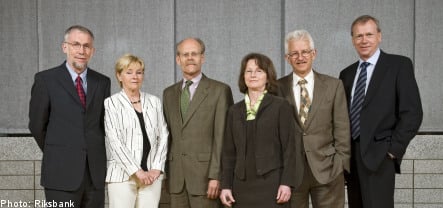Ten out of 19 analysts polled by Reuters on Friday forecast a quarter percentage point cut to 4 percent, while the others saw the bank on hold. Meanwhile, market players said forward rates indicated markets had fully priced in a cut.
“More than 25 points is priced for in next week. It’s 50/50 whether it will be 25 or 50 basis points,” said Torbjörn Isaksson, analyst at Nordea.
The Riksbank’s next monetary policy meeting is on October 22nd, with the announcement and a monetary policy report released the day after. The final announcement of the year is on December 17th.
On October 8th, the bank cut rates half a point, joining many central banks around the globe in an emergency coordinated move to soften the blow from a widening and deepening crisis.
Early in September — days before the collapse of US investment bank Lehman Brothers sparked a plunge in the world’s financial markets — the Riksbank raised rates for the 13th time since 2006 to address stubbornly high inflation.
Analysts said at that time the hiking cycle was over. But as late as September
25th the majority view in a poll was that rates would start to come down only in
2009.
Swedish annual consumer price inflation has been above the central bank’s 3 percent maximum tolerance level since November 2007. In September, it was
4.4 percent.
The export-dependent country’s once-booming economy has slowed sharply this year, with second-quarter growth a meagre 0.6 percent, and the global crisis has begun hitting the jobs market.
Sweden has taken steps to boost confidence and ease liquidity strains in the financial sector but policymakers and banks have said the banks are solvent and better-equipped than overseas peers to weather the financial storm.



 Please whitelist us to continue reading.
Please whitelist us to continue reading.